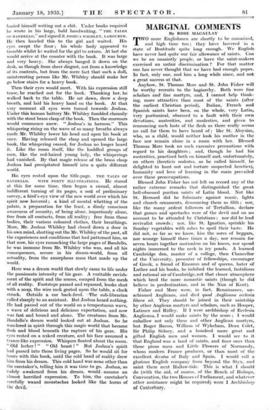MARGINAL COMMENTS
By ROSE MACAULAY
TWO more Englishmen are shortly to be canonized, and high time too ; they have hovered in a state of Beatitude quite long enough. We English- have never had quite our fair allowance of saints. Can we be an unsaintly people, or have the saint-makers exercised an unfair discrimination ? For that matter one has never thought that we have had enough popes. In fact, only one, and him a long while since, and not a great success at that.
Anyhow, St. Thomas More and' St. John Fisher will he worthy recruits to the hagiarchy. Both were fine scholars and' fine martyrs, and, I Cannot help think- ing, more attractive than most of the saints (after the earliest Christian period). Italian, French and Spanish saints lia:ve been, on the whole, very Latin, Very puritanical, obsessed to a fault with their own devotions, austerities, and modesties, and given to renouncing such lusts of the flesh as there really seems no call for them to have heard of ; like St. Aloysius, who, as a child, would neither look his mother in the face nor remain alone in a room with her. Blessed Thomas More took no such excessive precautions with regard to his daughters ; and, though he had his austerities, practised both on himself and, unfortunately, on others (hereticis molestus, as he called himself, he delighted to hunt out and torture suspected heretics); humanity • and love of learning in the main prevailed over these preoccupations.
Blessed John Fisher has not left on record any of the rather extreme remarks that distinguished the great hell-obsessed puritan saints of Latin blood. Not like St. Bernard did he fulminate against music, lights and church ornaments, denouncing them as filth ; nor, like the many ,ardent followers of Tertullian, declare that games and spectacles were of the devil and on no account to be attended- by Christians ; nor did he lead revivalist crowds ; nor, like St. Ignatius, sprinkle his Sunday vegetables with ashes to spoil their taste. He did not, as far as we know, kiss the sores of beggars, nor scourge himself three times a day, nor remain for seven hours together motionless on his knees, nor spend nights immersed to the neck in icy ponds. A learned Cambridge don, master of a college, then Chancellor of the University, presenter of fellowships, encourager of Greek, a friend of Erasmus and of queens, hater of Luther and his books, he imbibed the learned, fastidious and rational air of Cambridge, not that closer atmosphere which bred the more monastic saints (though he did believe in predestination, and in the Nun of Kent).
Fisher and More were, in fact, Renaissance, un- schismed Anglicans, and died quod Anglicana ecclesia libera sit. They should be joined in their saintship by other Anglican martyrs and scholars, such as Hooper, Latimer and Ridley. If I were archbishop of Ecelesia Anglicana, I would make saints by the score ; I would enhallow not only these and other Anglican martyrs, but Roger Bacon, William of Wykeham, Dean Colet, Sir Philip Sidney, and a hundred more great and gifted English men and women. I would see to it 'that England was a land of saints,' and finer ones than -those pious nuns and Little Flowers of Normandy, whom modern France produces, or than most of the excellent devotos of Italy and Spain. I would call a glorious English company from beyond the Styx, and saint them next Hallow-tide. This is what I should do (with the aid, of course, of the Bench of Bishops, Convocation, the two Houses of Parliament, and whatever other assistance might be required) were I Archbishop of Canterbury.






































 Previous page
Previous page